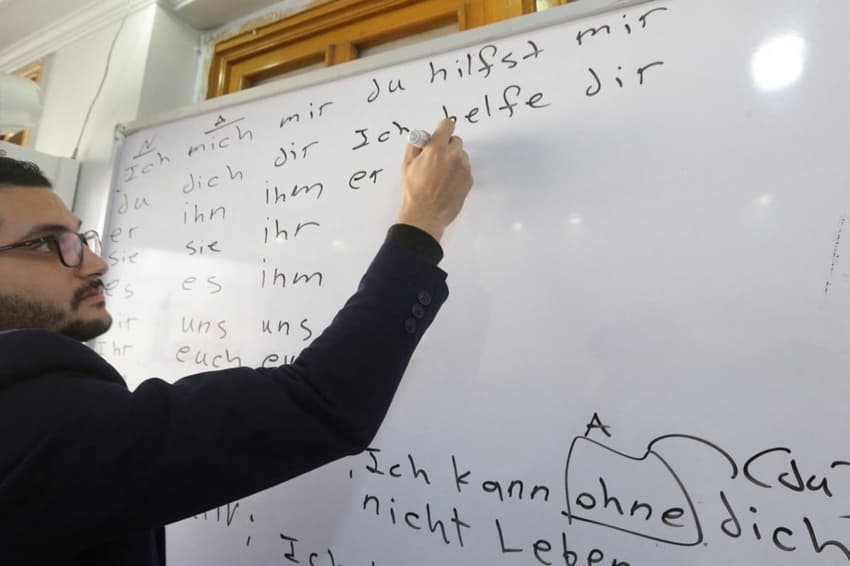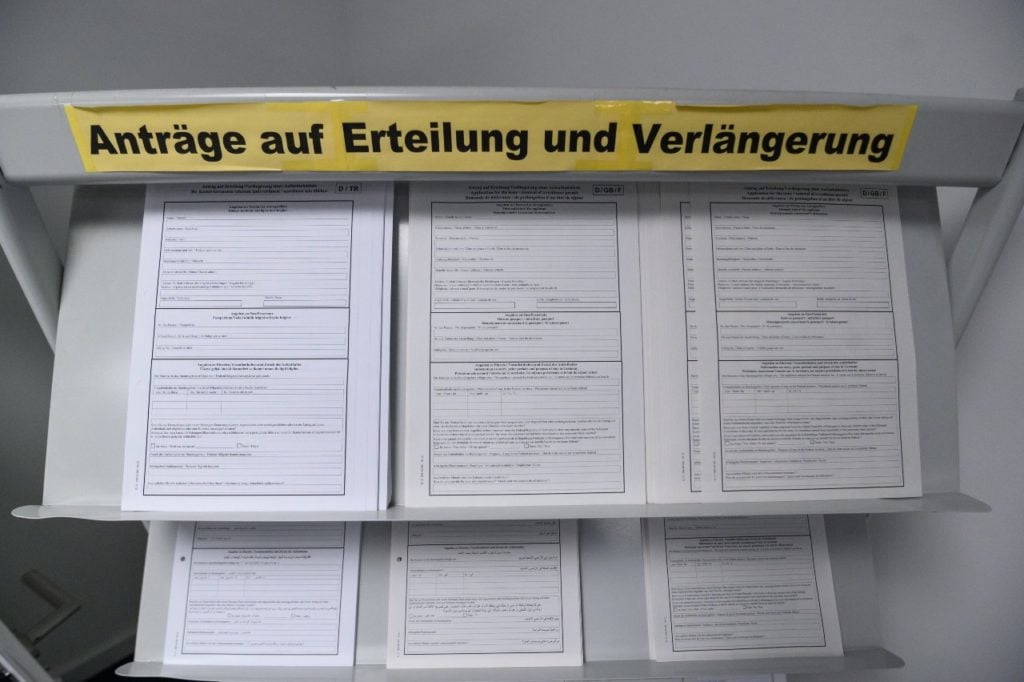EXPLAINED: How do I get a language study visa or permit for Germany?

A language study visa or permit could let you study German in Germany intensively for anywhere from three months to a year. It’s relatively unbureaucratic to apply for, but expect a fair few restrictions.
If you’re looking to both improve your German and potentially check to see if it might be interesting to live and work in Germany down the line, the language study visa and permit may be for you.
What’s the difference between the language study visa and the permit?
The visa allows you to stay in Germany for up to three months for the purposes of studying German. You apply for it from a German mission abroad.
The permit allows you to stay for anywhere from between three months to a year for language learning, and you're required to apply for it from your local immigration office after arriving in Germany.
Who needs this visa and permit?
Not everyone necessarily needs the visa, depending on your nationality.
Plenty of German courses in Germany last for less than three months and nationals of countries like the US, UK, Canada, Australia, New Zealand, South Korea, Israel and Japan can already visit for up to three months as a tourist with no visa.
Anyone who doesn’t have a visa-free right to travel to Germany for up to three months can apply for this visa from a German mission abroad.
Any non-EU/EEA or Swiss national who wants to stay in Germany to learn German for more than three months needs the language study residence permit.
Nationals who have a visa-free right to enter Germany for up to three months may be able to enter without the visa, but will still need to visit their local immigration office to apply for a residence permit if they plan on staying longer than three months.

"Applications for issuance and extension" is written on a display stand with applications for residence permits. Any non-EU national planning to stay in Germany for longer than three months typically requires one. Photo: picture alliance/dpa | Jonas Walzberg
Someone who isn't entitled to visa-free travel to Germany would have to apply for the visa before arriving and apply again for the residence permit for language learning within three months of arriving—if they intend to stay longer than three months.
With the language study residence permit, you can stay longer than three months—potentially up to a full year. Officials will typically grant it up until the end of the month that your language course finishes.
The language courses applicants are expected to enrol in and complete also need to have at least 18 hours a week of lessons.
READ ALSO: COMPARED: Germany’s Chancenkarte vs. Austria’s Red-White-Red card for skilled non-EU workers
What do I need to apply for this visa or permit?
The documents needed to apply for either the language study visa or residence permit are essentially the same.
You’ll need to find an accredited German course and typically register and pay the course fee. At least part of this fee may be non-refundable in many cases. The language school should then be able to issue you a confirmation of when your course is, that you’ve registered and paid, and how long your course will last. You’ll typically need this confirmation to apply.
Along with your application forms, you’re also going to need two recent passport photos, proof that you’re either reserved or booked accommodation, and a passport that has at least two free pages and is valid for at least three months beyond the end of your stay. Your passport also cannot be any older than ten years.

Internationals take part in a German course at a language school in Munich. Photo: picture alliance/dpa | Sven Hoppe
You’ll also need to prove financial resources and insurance coverage. You’ll need to provide proof of health, travel, and accident insurance that covers you for the entire length of your stay in Germany if something goes wrong.
You’ll also need to prove that you have the financial resources to cover you during your stay in the prorated amount of €11,208 per year. You can submit a number of documents for this, such as a fixed deposit statement from a blocked account, bank statements from the last three months, a guarantee from your German hosts or your parents—if they can provide their salary slips or bank statements, or a scholarship award certificate.
READ ALSO: How to open a blocked account in Germany
If you’re an employee, you may need an official letter of leave from your employer that is signed and stamped.
If you need the visa, you may have to write a letter of motivation for attending the German course and prove your accommodation for the entire stay.
To apply for the residence permit to stay for longer than three months, you won’t typically have to submit the letter of motivation - but be prepared to have most of the other documents ready.
You’ll need to provide evidence that you’re attending the course, such as your certificate of registration or agreement with the language school.
To prove your accommodation, you’ll typically need your registration certificate—or Anmeldung—from your nearest Bürgeramt and possibly your rental contract.
What can’t you do under a language study visa or permit?
Under a language study visa or permit, you cannot study at a university for any qualification other than bettering your German language skills.
You also cannot typically convert your status into one that will let you work or study at a German university for a degree without first returning to your home country, or in the case of some nationalities applying for a new residency status.
READ ALSO: Germany or Austria: Where is it easier to get an EU Blue Card?
Comments
See Also
If you’re looking to both improve your German and potentially check to see if it might be interesting to live and work in Germany down the line, the language study visa and permit may be for you.
What’s the difference between the language study visa and the permit?
The visa allows you to stay in Germany for up to three months for the purposes of studying German. You apply for it from a German mission abroad.
The permit allows you to stay for anywhere from between three months to a year for language learning, and you're required to apply for it from your local immigration office after arriving in Germany.
Who needs this visa and permit?
Not everyone necessarily needs the visa, depending on your nationality.
Plenty of German courses in Germany last for less than three months and nationals of countries like the US, UK, Canada, Australia, New Zealand, South Korea, Israel and Japan can already visit for up to three months as a tourist with no visa.
Anyone who doesn’t have a visa-free right to travel to Germany for up to three months can apply for this visa from a German mission abroad.
Any non-EU/EEA or Swiss national who wants to stay in Germany to learn German for more than three months needs the language study residence permit.
Nationals who have a visa-free right to enter Germany for up to three months may be able to enter without the visa, but will still need to visit their local immigration office to apply for a residence permit if they plan on staying longer than three months.

Someone who isn't entitled to visa-free travel to Germany would have to apply for the visa before arriving and apply again for the residence permit for language learning within three months of arriving—if they intend to stay longer than three months.
With the language study residence permit, you can stay longer than three months—potentially up to a full year. Officials will typically grant it up until the end of the month that your language course finishes.
The language courses applicants are expected to enrol in and complete also need to have at least 18 hours a week of lessons.
READ ALSO: COMPARED: Germany’s Chancenkarte vs. Austria’s Red-White-Red card for skilled non-EU workers
What do I need to apply for this visa or permit?
The documents needed to apply for either the language study visa or residence permit are essentially the same.
You’ll need to find an accredited German course and typically register and pay the course fee. At least part of this fee may be non-refundable in many cases. The language school should then be able to issue you a confirmation of when your course is, that you’ve registered and paid, and how long your course will last. You’ll typically need this confirmation to apply.
Along with your application forms, you’re also going to need two recent passport photos, proof that you’re either reserved or booked accommodation, and a passport that has at least two free pages and is valid for at least three months beyond the end of your stay. Your passport also cannot be any older than ten years.

You’ll also need to prove financial resources and insurance coverage. You’ll need to provide proof of health, travel, and accident insurance that covers you for the entire length of your stay in Germany if something goes wrong.
You’ll also need to prove that you have the financial resources to cover you during your stay in the prorated amount of €11,208 per year. You can submit a number of documents for this, such as a fixed deposit statement from a blocked account, bank statements from the last three months, a guarantee from your German hosts or your parents—if they can provide their salary slips or bank statements, or a scholarship award certificate.
READ ALSO: How to open a blocked account in Germany
If you’re an employee, you may need an official letter of leave from your employer that is signed and stamped.
If you need the visa, you may have to write a letter of motivation for attending the German course and prove your accommodation for the entire stay.
To apply for the residence permit to stay for longer than three months, you won’t typically have to submit the letter of motivation - but be prepared to have most of the other documents ready.
You’ll need to provide evidence that you’re attending the course, such as your certificate of registration or agreement with the language school.
To prove your accommodation, you’ll typically need your registration certificate—or Anmeldung—from your nearest Bürgeramt and possibly your rental contract.
What can’t you do under a language study visa or permit?
Under a language study visa or permit, you cannot study at a university for any qualification other than bettering your German language skills.
You also cannot typically convert your status into one that will let you work or study at a German university for a degree without first returning to your home country, or in the case of some nationalities applying for a new residency status.
READ ALSO: Germany or Austria: Where is it easier to get an EU Blue Card?
Join the conversation in our comments section below. Share your own views and experience and if you have a question or suggestion for our journalists then email us at [email protected].
Please keep comments civil, constructive and on topic – and make sure to read our terms of use before getting involved.
Please log in here to leave a comment.